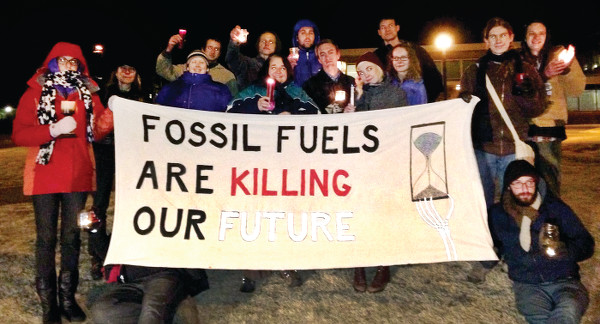
PHOTO/ANNA DURRETT
Year of Action Indeed!
SOUTHERN ILLINOIS—Fresh life is coming to Illinois in the middle of a long cold winter. Students at Southern Illinois University in Carbondale are meeting on a regular basis to talk about civil liberties, nonviolent direct action, climate change and what they can do about it.
Small rooms in libraries across rural counties are bursting with local people who want to find out about voter referendums to protect property owners’ rights from industrialized fracking, sand mining, and pipelines carving up the land.
Citizens gather in restaurants asking activists for help with coal mining companies who are logging, filling streams with sediment, then blowing up hilltops containing native Indigenous burial grounds only known to the Shawnee Tribal People.
Nonviolent direct action does not have to mean arrests or pepper spray. That’s an extreme example that seems to catch the news, but in rural organizing, groups need to be smart and efficient with resources. Peaceful direct actions include petition drives ranging from all-out bans on fracking, to a localized ban in the New Madrid and Wabash seismic zones, to a pledge of solidarity with frack fighters.
In attempt to stop frac sand mining near Starved Rock State park, a social media action involving a meme listed county board members’ phone numbers to call and ask for a halt to permits.
A sustained action with the intent to delay the process, involving submitting daily comments to Department of Natural Resources amounted to a record-breaking 32,000 public comments on faulty fracking rules.
Most recently a video was released about defective class two injection wells contaminating a property owner’s water well. There have been a few banner drops, and just for good humor Frackmas caroling posted on YouTube.
Activists are working every avenue possible to avoid the destruction of their communities and surrounding environment, while industry attempts to milk every last drop of fossil fuel from the earth.
Communities are asking to be educated about nonviolent forms of direct action, how to protect civil liberties, and have been creatively working to eliminate the taboo surrounding nonviolent direct action.
They are asking how to create campaigns and organize in a way that will be effective against the system. Grassroots movements to protect ecosystems and basic human rights, like the right to clean water and air, are growing.
This is not endemic to Illinois.
This is a global pattern playing out in every community that holds clean water and breathable air a priority, by refusing to become the next sacrifice zone destroyed by industries like fracking, pipelines, or frac sand mining.
Activists are stepping out of the box, trying on varying forms of dissent using tools like social media and Twitter, combined with old fashion kitchen table talks, to grow a movement.
Anyone anywhere can join the movement by 1) Hosting civil liberties training in your community, 2) donating resources, time or supplies to local organizational efforts, and/or 3) joining or supporting nonviolent direct action campaigns like rallies, protests or candlelight vigils.
